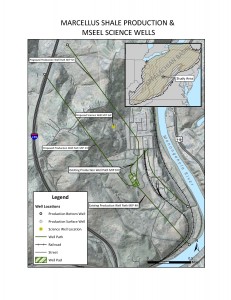
One vertical “science well” & four horizontal production wells — (click on the geographic image above to enlarge it)
From an Article by WVU News, November 6, 2014
As the Appalachian Region feels the impact of the burgeoning shale-energy industry, a consortium of researchers and industrial partners led by West Virginia University, with the assistance of The Ohio State University, will conduct the first-ever long-term, comprehensive field study of a natural resource that has changed the country’s – and the world’s – energy supply.
The five-year, $11 million agreement with the U.S. Department of Energy will allow the research team to create and manage the Marcellus Shale Energy and Environment Laboratory, a field site and dedicated research laboratory at the Morgantown Industrial Park.
Together with the DOE’s National Energy Technology Laboratory and Northeast Natural Energy – a Charleston-based private oil and natural gas company that owns and operates the site – the lab will engage a unique and diverse team of geoscientists, hydrologists, engineers, ecologists, social scientists and public health professionals. The team will identify and demonstrate technologies required for best practices in environmentally responsible shale development, from drilling to completion through production.
Additionally, the lab will offer real-world education and training for undergraduate and graduate students to address the complex technical, environmental and social issues surrounding unconventional energy development and production.
Ohio State will work with WVU to provide support of subsurface scientific investigations of the geology and microbiology from samples taken in the drill hole, along with guidance and support for the environmental work at the site.
“We have deep roots in West Virginia and it is our goal to help any way we can,” said Mike John, chief executive officer of Northeast Natural Energy. “Our participation in the this project is driven by our desire to help improve science, enhance technology and expand understanding of the natural gas industry.”
Shale gas is natural gas that is trapped inside formations of shale – sedimentary rock found deep underground. To release it, shale-gas producers drill a deep vertical well and then use a combination of technologies to target horizontal drilling and hydraulic fracturing (or fracking) – which uses pressurized water, sand and chemicals to crack subsurface rock and create fissures that release natural gas.
Additionally, recent news reports state that fracking and other unconventional techniques have already doubled North American natural gas reserves to three quadrillion cubic feet, which is nearly equal to 500 billion barrels of oil, or almost double the crude inventory of Saudi Arabia – the world’s top oil producer.
The Marcellus Shale Energy and Environment Laboratory will allow the team to address critical gaps of knowledge of the characterization, basic subsurface science, and completion and stimulation strategies that enable more efficient resource recovery from fewer wells with reduced environmental impact.
The primary objectives of the project include providing a long-term research site with an existing well and documented production and environment baseline from two previously completed wells.
A dedicated scientific-observation well will be used to collect detailed subsurface data and to monitor and test technologies in additional wells to be drilled periodically over the project lifetime.
The site also offers a unique opportunity to enable an open, collaborative and integrated program of science and technology development and testing to minimize environmental impacts while maximizing economic benefits.
The following areas at WVU are participating in the study ~ • Civil and Environmental Engineering, • Geology and Geography, • Petroleum and Natural Gas Engineering, • Public Administration, • Public Health, • Regional Research Institute, • Geographic Information Systems Tech Center, • West Virginia Water Research Institute.
The project is operated under the purview of a 2013 memorandum of understanding between WVU and Ohio State. As part of the shale-energy partnership, the two institutions agreed to work collaboratively to develop a joint program of research in the Appalachian Region’s developing shale energy industry.
-WVU- (11/6/2014)
>>>>>>………………>>>>>>………………>>>>>>>
UPDATE ~ The MSEEL project ended September 30, 2021 and has 90 days to submit a final report. A draft final report was submitted to DOE on December 21. Revisions have been requested by DOE and a final report is expected by the end of the year. It will be made available through OSTI. For more information on MSEEL go to MSEEL.org or edx.netl.doe.gov.
SOURCE ~ Robert Vagnetti, MSEEL-federal project manager (12/27/21)
